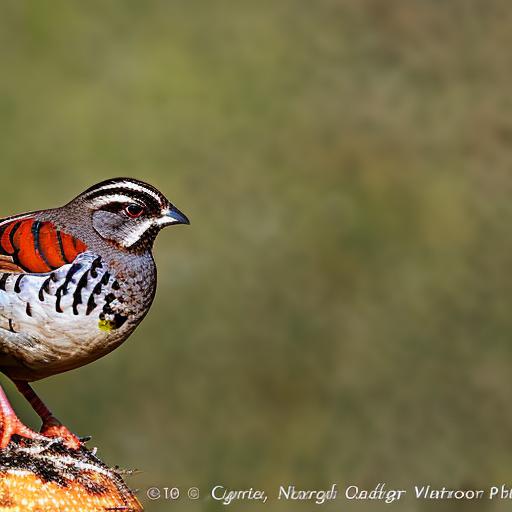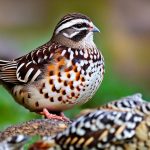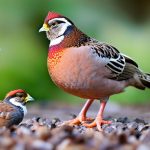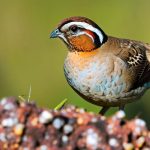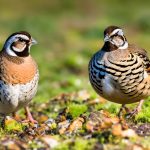Quails are small, ground-dwelling birds that are known for their social behavior and tendency to forage in groups. They are often found in grasslands, agricultural fields, and open woodlands, where they feed on seeds, insects, and small invertebrates. Quails are also known for their nesting behavior, as they build their nests on the ground and lay their eggs in shallow depressions lined with grass and other plant materials.
Understanding quail behavior is essential for effectively managing and deterring them from your garden or property. By knowing their habits and preferences, you can implement strategies that will discourage quails from causing damage to your plants and landscaping. For example, knowing that quails are attracted to areas with dense vegetation and ample food sources can help you identify potential hotspots for quail activity and take proactive measures to protect vulnerable areas.
Furthermore, understanding the mating and nesting behavior of quails can help you anticipate their movements and take steps to prevent them from establishing nesting sites in your garden. By familiarizing yourself with the behavior patterns of quails, you can develop a comprehensive approach to managing their presence and minimizing the potential for damage to your plants and property.
Key Takeaways
- Quail are ground-dwelling birds that are attracted to open areas with low-growing vegetation and are known to feed on seeds, insects, and small fruits.
- Choose plants that are less appealing to quail, such as those with strong scents, prickly textures, or bitter tastes, to minimize damage to your garden.
- Install physical barriers like fences, netting, or cloches to protect vulnerable plants and prevent quail from accessing them.
- Use natural repellents like garlic or chili pepper sprays to deter quail from foraging in your garden.
- Create distractions by providing alternative food sources or planting sacrificial crops to divert quail away from your prized plants.
- Regularly maintain and monitor your garden for signs of quail activity, and take prompt action to address any issues.
- If quail infestation becomes overwhelming, seek professional help from pest control experts or wildlife management authorities.
Choosing Quail-Resistant Plants
One effective way to deter quails from causing damage to your garden is to choose plants that are resistant to their feeding habits. Quails are known to feed on a variety of plant materials, including seeds, fruits, and tender shoots. By selecting plants that are less palatable to quails, you can reduce the likelihood of them causing damage to your landscaping.
When choosing quail-resistant plants, it’s important to consider the specific species of quails in your area and their feeding preferences. For example, quails may be less likely to feed on plants with thorny or spiky foliage, as these can be less appealing and more difficult to access. Additionally, plants with strong scents or bitter tastes may also be less attractive to quails, making them less likely to cause damage.
Some examples of quail-resistant plants include ornamental grasses, succulents, and plants with tough or leathery leaves. These types of plants are less likely to be targeted by quails and can help minimize the potential for damage in your garden. By strategically incorporating quail-resistant plants into your landscaping, you can create a more resilient and less appealing environment for quails, reducing the need for additional deterrent measures.
Installing Physical Barriers
Another effective strategy for deterring quails from causing damage to your garden is to install physical barriers that prevent them from accessing vulnerable areas. Physical barriers can take many forms, including fences, netting, and other structures that create a barrier between quails and your plants.
When installing physical barriers, it’s important to consider the specific behaviors and capabilities of quails. For example, quails are ground-dwelling birds that are capable of flying short distances, so it’s important to ensure that any barriers are secure and cover the areas where quails are likely to cause damage. Additionally, physical barriers should be designed to withstand the weather conditions in your area and remain effective over time.
Fences and netting can be particularly effective at preventing quails from accessing vulnerable areas, such as vegetable gardens or newly planted seedlings. By creating a physical barrier between quails and your plants, you can significantly reduce the potential for damage and create a more secure environment for your landscaping. When installing physical barriers, it’s important to consider the specific needs of your garden and choose materials that are durable and effective at deterring quails.
Using Natural Repellents
In addition to physical barriers, natural repellents can also be effective at deterring quails from causing damage to your garden. Natural repellents can take many forms, including scents, tastes, and textures that are unappealing to quails and discourage them from feeding on your plants.
One common natural repellent for quails is the use of strong scents or tastes that are unappealing to them. For example, the scent of garlic or hot peppers can be effective at deterring quails from feeding on plants, as they find these scents unpleasant and may avoid areas where they are present. Additionally, natural repellents can also include textures that are uncomfortable for quails, such as rough or prickly surfaces that make it difficult for them to access vulnerable areas.
When using natural repellents, it’s important to consider the specific needs of your garden and choose options that are safe and effective at deterring quails. Additionally, natural repellents should be applied strategically to target areas where quails are likely to cause damage, such as around vegetable gardens or fruit trees. By incorporating natural repellents into your overall strategy for managing quail activity, you can create a more resilient and less appealing environment for these birds.
Creating Distractions
Another effective strategy for managing quail activity in your garden is to create distractions that divert their attention away from vulnerable areas. By providing alternative food sources or habitat features that are more appealing to quails, you can reduce the likelihood of them causing damage to your plants and landscaping.
One way to create distractions for quails is to provide alternative food sources that are more attractive to them than your garden plants. For example, setting up bird feeders with seeds or grains that are appealing to quails can help draw them away from vulnerable areas and reduce the potential for damage. Additionally, creating habitat features such as brush piles or dense vegetation can provide shelter and nesting sites for quails, making these areas more appealing than your garden.
When creating distractions for quails, it’s important to consider the specific needs and preferences of these birds and provide options that are attractive and beneficial to them. By strategically incorporating distractions into your garden design, you can create a more balanced and less appealing environment for quails, reducing the potential for damage to your plants and property.
Regular Maintenance and Monitoring
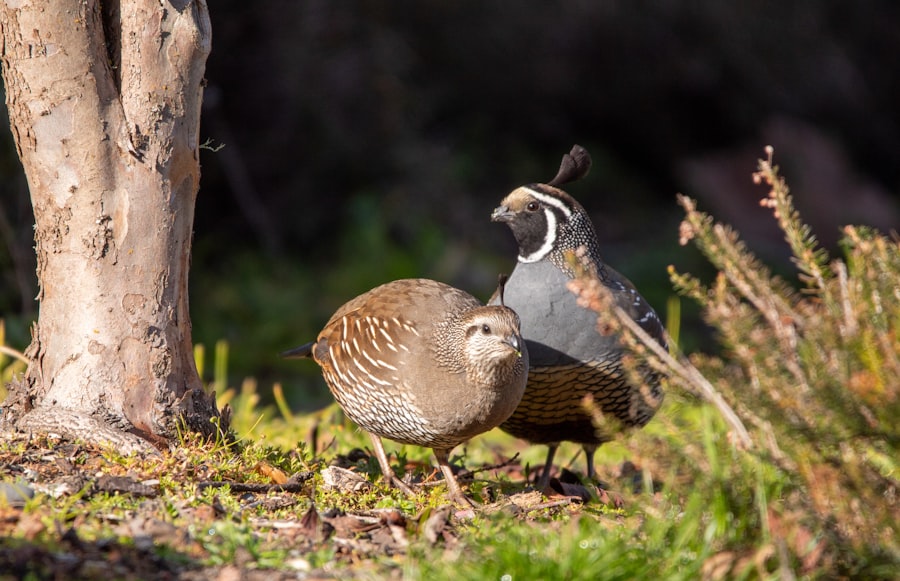
Regular maintenance and monitoring of your garden are essential for effectively managing quail activity and minimizing the potential for damage. By staying vigilant and addressing potential issues as they arise, you can prevent quails from establishing damaging behaviors and create a more secure environment for your plants.
Regular maintenance includes tasks such as pruning overgrown vegetation, removing fallen fruits or seeds, and keeping your garden clean and free of debris that may attract quails. By maintaining a tidy and well-managed garden, you can reduce the likelihood of quails finding suitable food sources or nesting sites and discourage them from causing damage.
In addition to regular maintenance, monitoring the activity of quails in your garden can help you identify potential hotspots for damage and take proactive measures to address them. By observing the behavior patterns of quails and staying aware of their movements, you can develop a more comprehensive approach to managing their presence and minimizing the potential for damage to your plants and property.
Seeking Professional Help
If you find that quail activity in your garden is causing significant damage despite your best efforts, seeking professional help may be necessary to effectively manage the situation. Professional pest control services or wildlife management experts can provide valuable insight and expertise in developing a comprehensive strategy for deterring quails and protecting your plants.
Professional help may include options such as installing specialized deterrents or implementing targeted management strategies that are tailored to the specific needs of your garden. Additionally, professional experts can provide guidance on legal considerations and ethical practices for managing quail activity in a humane and responsible manner.
By seeking professional help, you can access valuable resources and support that can help you effectively manage quail activity in your garden and minimize the potential for damage. Professional experts can provide valuable insight into the behavior patterns of quails and develop customized solutions that are tailored to the specific needs of your property.
In conclusion, understanding quail behavior is essential for effectively managing their presence in your garden or property. By choosing quail-resistant plants, installing physical barriers, using natural repellents, creating distractions, maintaining regular maintenance and monitoring, and seeking professional help when necessary, you can develop a comprehensive approach to deterring quails and protecting your plants from potential damage. With careful planning and strategic implementation of these strategies, you can create a more secure environment for your landscaping while minimizing the impact of quail activity on your property.
If you’re looking for tips on how to keep quail out of your hanging pots, you might also be interested in learning about the best practices for maintaining a chicken coop. Check out this informative article on chicken coop care in Chester, SC to ensure your feathered friends are happy and healthy.
FAQs
What are some effective methods for keeping quail out of hanging pots?
Some effective methods for keeping quail out of hanging pots include using physical barriers such as wire mesh or netting, using repellents such as predator urine or spicy sprays, and creating distractions with decoy food sources.
Why is it important to keep quail out of hanging pots?
It is important to keep quail out of hanging pots because they can damage the plants, disturb the soil, and create a mess with their droppings. Additionally, quail may carry diseases or pests that can harm the plants in the hanging pots.
Are there any natural or non-toxic methods for keeping quail out of hanging pots?
Yes, there are natural and non-toxic methods for keeping quail out of hanging pots. These include using physical barriers, such as netting or wire mesh, and using natural repellents, such as spicy sprays or predator urine.
What are some common plants that quail are attracted to in hanging pots?
Quail are attracted to a variety of plants in hanging pots, including succulents, herbs, and flowering plants. They may be particularly drawn to plants with edible leaves or flowers.
Are there any legal restrictions on keeping quail out of hanging pots?
It is important to check local regulations and laws regarding wildlife management before implementing any methods to keep quail out of hanging pots. In some areas, certain methods or actions may be restricted or prohibited.
Meet Walter, the feathered-friend fanatic of Florida! Nestled in the sunshine state, Walter struts through life with his feathered companions, clucking his way to happiness. With a coop that’s fancier than a five-star hotel, he’s the Don Juan of the chicken world. When he’s not teaching his hens to do the cha-cha, you’ll find him in a heated debate with his prized rooster, Sir Clucks-a-Lot. Walter’s poultry passion is no yolk; he’s the sunny-side-up guy you never knew you needed in your flock of friends!

